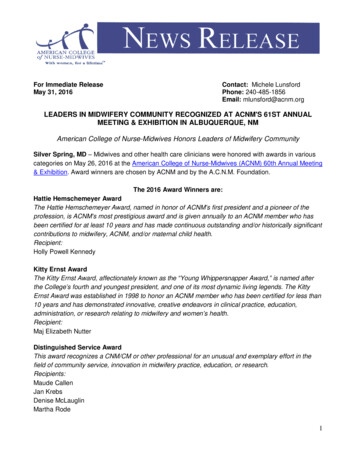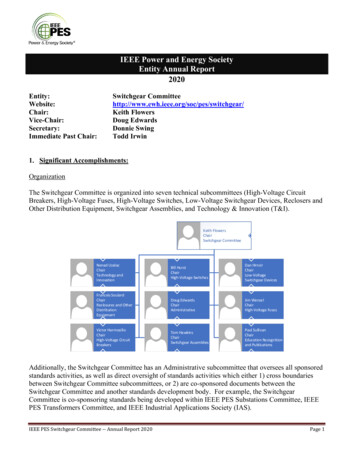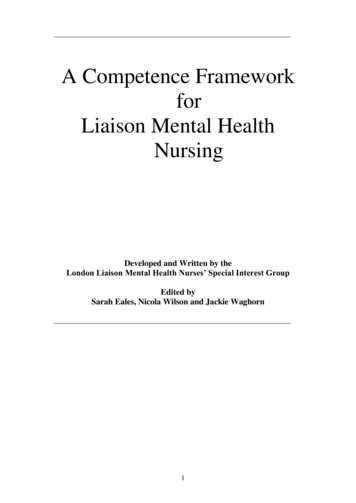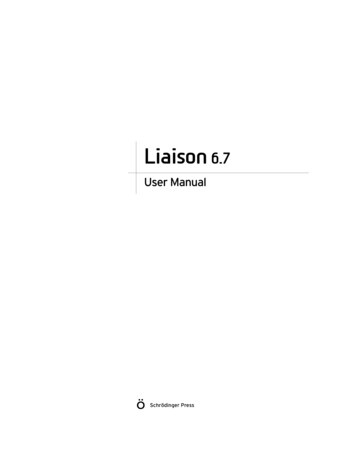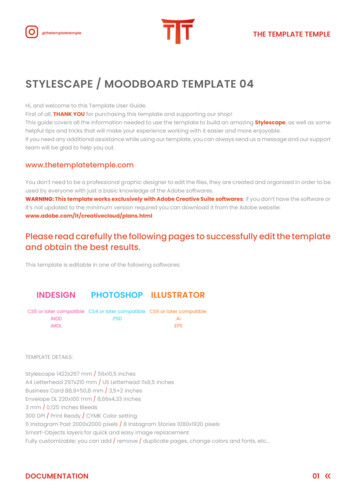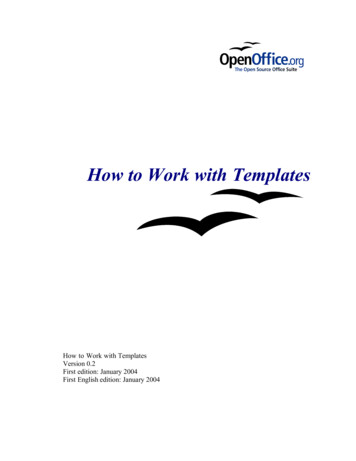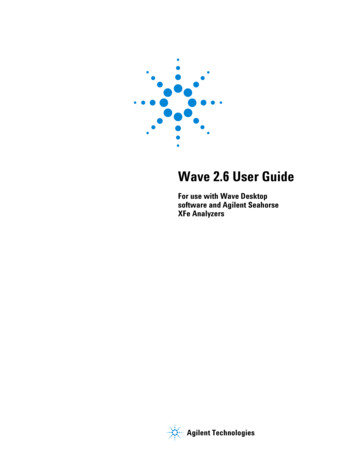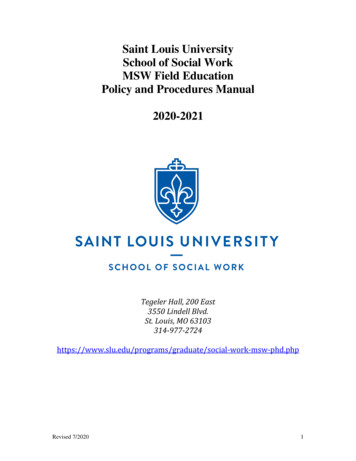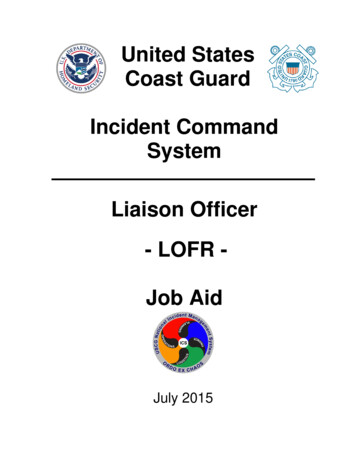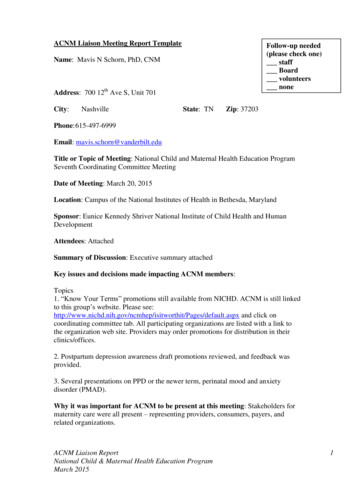
Transcription
ACNM Liaison Meeting Report TemplateFollow-up needed(please check one)staffBoardvolunteersnoneName: Mavis N Schorn, PhD, CNMAddress: 700 12th Ave S, Unit 701City:NashvilleState: TNZip: 37203Phone: 615-497-6999Email: mavis.schorn@vanderbilt.eduTitle or Topic of Meeting: National Child and Maternal Health Education ProgramSeventh Coordinating Committee MeetingDate of Meeting: March 20, 2015Location: Campus of the National Institutes of Health in Bethesda, MarylandSponsor: Eunice Kennedy Shriver National Institute of Child Health and HumanDevelopmentAttendees: AttachedSummary of Discussion: Executive summary attachedKey issues and decisions made impacting ACNM members:Topics1. “Know Your Terms” promotions still available from NICHD. ACNM is still linkedto this group’s website. Please ges/default.aspx and click oncoordinating committee tab. All participating organizations are listed with a link tothe organization web site. Providers may order promotions for distribution in theirclinics/offices.2. Postpartum depression awareness draft promotions reviewed, and feedback wasprovided.3. Several presentations on PPD or the newer term, perinatal mood and anxietydisorder (PMAD).Why it was important for ACNM to be present at this meeting: Stakeholders formaternity care were all present – representing providers, consumers, payers, andrelated organizations.ACNM Liaison ReportNational Child & Maternal Health Education ProgramMarch 20151
Follow up (i.e. next meeting, any action necessary on our part, important deadlines,etc.): No action necessary on the part of the national office. I will continue to serve asa liaison for the organization unless the board would like someone else to serve.Feedback (any thoughts or suggestions you may have):1. Post/circulate the links to the consumer promotions.2. Web site: http://www.nichd.nih.gov/ncmhep/coord Comm/I asked last year whether the ACNM site could like back to this site. I don’tsee it anywhere on the ACNM site. Still would recommend it since there areconsumer materials available our members might like to use.ACNM Staff Use OnlyComments:ACNM Liaison ReportNational Child & Maternal Health Education ProgramMarch 20152
National Child and Maternal Health Education Program (NCMHEP)Coordinating Committee MeetingFriday, March 20, 2015Participant ListAcademic Pediatric AssociationAmerican College of Nurse MidwivesDr. Tony Burgos9333 Imperial Highway, 3 East,Room H33R46Downey, CA 90242Phone: 562–647–7437Email: Anthony.e.burgos@kp.orgDr. Mavis Schorn461 21st Avenue, South, Frist #348Nashville, TN 37240Phone: 615–343–5876Email: mavis.schorn@vanderbilt.eduAmerican Academy of PediatricsAmerican College of Obstetriciansand GynecologistsMr. Jim CoutoDirector, Division of Hospital and SurgicalServices141 NW Point BoulevardElk Grove Village, IL 60007Phone: 847–434–7656Email: jcouto@aap.orgMs. Debra HawksSenior Director, Practice Activities,Obstetrics and ImmunizationsPO Box 70620Washington, DC 20024-9998Phone: 202–863–2445Email: dhawks@acog.orgDr. Marilyn Escobedo1200 Everett DriveOklahoma City, OK 73104Phone: 405–271–5215Email: marilyn-escobedo@ouhsc.eduAmerican Medical AssociationAmerican Association ofNurse PractitionersDr. Anne NormanAssociate Vice President of Education901 South MoPac Expressway, Building 2,Suite 450Austin, TX 78746Phone: 512–442–4262, ext. 5225Email: anorman@aanp.org*participating remotelyDr. Mary Anne McCaffreeMember, Board of Trustees330 N. Wabash Avenue, Suite 39300Chicago, IL 60611Phone: 312–464–4140Email: maryanne.mccaffree@ama-assn.orgAmerican Psychological AssociationDr. Lauren Fasig CaldwellDirector, Children, Youth, and FamiliesOfficePublic Interest Directorate750 First Street, NEWashington, DC 20002Phone: 202–336–6163Email: lcaldwell@apa.org1
Association of Women’s Health,Obstetric and Neonatal NursesMs. Anne Santa-DonatoDirector, Obstretic Programs2000 L Street, NW, Suite 740Washington, DC 20036Phone: 202–261–2436Email: annesd@awhonn.orgCenters for Disease Control andPrevention*Ms. Cynthia FerreEpidemiologistDivision of Reproductive Health4770 Buford Highway, NEAtlanta, GA 30341Phone: 770–488–6268Email: cdf1@cdc.gov*Dr. Jean KoEpidemiologist, Maternal and Infant HealthBranchCommunications Chair, Mental HealthWorkgroup4770 Buford Highway, NEAtlanta, GA 30341Phone: 770–488–6083 (M/W/F) or440–997–9382 (T/Th)Email: fob1@cdc.govDHHS, Office of Minority HealthDr. Alexis BakosSenior Advisor1101 Wootton Parkway, Suite 600Rockville, MD 20852Phone: 240–453–6154Email: alexis.bakos@hhs.govDHHS, Office on Women’s HealthDr. Beth Collins SharpDirector, Division of Program Innovation200 Independence Avenue, SW Room712EWashington, DC 20201Phone: 202–260–0020Email: Beth.Collins-Sharp@hhs.govHealthy Mothers, Healthy BabiesMs. Janice Frey-AngelChief Executive Officer4401 Ford Avenue, Suite 300Alexandria, VA 22302Phone: 703–838–7545Email: jfreyangel@hmhb.orgMarch of Dimes FoundationMs. Janis BiermannSenior Vice President, Education andHealth Promotion1275 Mamaroneck AvenueWhite Plains, NY 10605Phone: 914–997–4434Email: jbiermann@marchofdimes.orgNational Association of PediatricNurse PractitionersDr. Dawn GarzonProgram Manager5 Hanover Square, Suite 1401New York, NY 10004Phone: 856–857–9700Email: d garzon@umsl.eduNational Medical AssociationDr. Susanne Tropez-Sims1005 Dr. D.B. Todd Jr. BoulevardNashville, TN 37208Phone: 615–327–6925Email: stsims@mmc.edu*participating remotely2
NIH, Eunice Kennedy ShriverNational Institute of Child Health andHuman DevelopmentDr. Triesta Fowler-LeeMedical Officer31 Center Drive, Building 31, Room 2A32Bethesda, MD 20892Phone: 301–435–3458Email: fowlerlt@mail.nih.govDr. Sarah GlavinActing Director, Office of Science, PolicyAnalysis and Communication31 Center Drive, Building 31, Room 2A18Bethesda, MD 20892Phone: 301–496–7898Email: glavins@mail.nih.govDr. Catherine SpongDeputy Director31 Center Drive, Building 31, Room 2A03Bethesda, MD 20892Phone: 301–496–1848Email: spongc@mail.nih.govMs. Christina StilePublic Health Advisor, PublicCommunications Branch31 Center Drive, Building 31, Room 2A32Bethesda, MD 20892Phone: 301–496–5136Email: stilec@mail.nih.govMr. Paul WilliamsChief, Public Communications Branch31 Center Drive, Building 31, Room 2A32Bethesda, MD 20892Phone: 301–496-5135Email: paul.williams@nih.govSociety for Pediatric Research*Dr. Susan Hintz750 Welch Road, Suite 315Palo Alto, CA 94304Phone: 650–723–5711Email: srhintz@stanford.eduSociety for Women’s Health Research*Ms. Martha NolanVice President, Public Policy1025 Connecticut Avenue, NW, Suite 701Washington, DC 20036Phone: 202–496–5007Email: martha@swhr.orgInvited GuestsNIH, National Institute of Mental HealthDr. Catherine RocaEmail: rocac@mail.nih.govPostpartum ProgressKatherine StoneEmail: katherine@postpartumprogress.orgPostpartum Support InternationalAdrienne GriffenEmail: adrienne.griffen@gmail.comPostpartum Support InternationalLynne McIntyreEmail: lynne@lynnemcintyre.comNIH, Office of Research onWomen’s HealthMs. Amy MistrettaEpidemiologist6707 Democracy BoulevardBethesda, MD 20892Phone: 301–496–9200Email: amy.mistretta@nih.gov*participating remotely3
Executive SummaryNational Child and Maternal Health Education Program (NCMHEP)Eunice Kennedy Shriver National Institute of Child Health and Human Development (NICHD)Seventh Coordinating Committee MeetingThis Executive Summary provides a high-level summary of the major points of discussion by topic fromthe NCMHEP Coordinating Committee meeting on March 20, 2015.MAJOR DISCUSSION POINTS“Is It Worth It?” and “Know Your Terms” Promotion Update – Ellen Robinson, M.H.S., Director,IQ Solutions (NICHD communications contractor) Rates for early elective deliveries have decreased to a national average of 3.4 percent in 2014;however, rates remain higher in rural areas. Coordinating Committee members are encouraged tosend the NICHD ideas to more effectively reach rural areas. Promotion efforts included direct mail of 56,000 postcards, public service announcements on topcable channels, and participation in the continuing education activity by more than 10,000 healthprofessionals. Outreach will continue through the year. Website content for the two initiatives is now available in Spanish on the new NICHD Spanishwebsite. The effectiveness of the promotion activities for these two initiatives is based on a number offactors, including number of persons reached, print materials ordered, CME/CE learners andcertificates for credit hours issued, and an analysis of traditional and social media efforts.Effects of Treatment for Postpartum Depression – Catherine Roca, M.D., Chief, Women’s Programs,National Institute of Mental Health A 2014 review of the literature found evidence of the effects of postpartum depression in infantdevelopment, including risk of insecure attachment, difficulties with bonding, and cognitivedelays, particularly expressive language. Chronicity is an important variable—the longer the child is exposed to a mother with depressivesymptoms, the more likely that child will have difficulties. Dr. Roca explained that eventually most people remit from postpartum depression, but it can takemonths to years, and during that time both mother and child are at risk for adverse outcomes. Perinatal mood and anxiety disorder (PMAD) is not a formal diagnosis and is not generally usedin the literature. However, it is commonly used in the field because there is so much co-morbidanxiety in postpartum depression, an important issue to highlight when talking with women. Studies have shown that depression in general makes one’s ability to understand that there issomeone out there who has different emotions than theirs difficult. There is evidence for positive effects of treatment of maternal depression on child development.1
Postpartum Support International (PSI) Presentation – Lynne McIntyre, M.S.W., LICSW, andAdrienne Griffen, M.P.P. There are several organizations that focus on supporting women with postpartum depression.Many of them have developed quality collateral materials. The term “postpartum depression” does not adequately convey the full extent of the condition. Asuggest term is postpartum mood and anxiety disorder (PMAD). The NICHD might consider including a reproductive mental health professional on theCoordinating Committee for this initiative. Within the health care community, there is a need for professional training among maternal andchild health providers, OB-GYNs, lactation consultants, pediatricians and other healthprofessionals who treat and refer patients with this diagnosis.Postpartum Progress – Katherine Stone Postpartum Progress stems from a blog Ms. Stone began to document her experiences withpostpartum depression and obsessive compulsive disorder. The organization raises awarenessand provides peer-to-peer support to women. Opportunities to move this issue forward include better surveillance, more translational research,improved coordination of care, more treatment options for those with limited access, andincreased education about recurrence issues. In developing outreach materials, Ms. Stone suggests use of language people know and use,avoiding a one-size-fits all approach, encouraging continued care, and ensuring resources arecurrent.Postpartum Depression (PPD) Discussion of Proposed Products – Triesta Fowler-Lee, M.D.,Medical Officer, NICHDMaterials The NICHD developed several outreach materials—three poster designs, an action plan, and aconversation starter for partners—based on formative research and issues raised by CoordinatingCommittee members during the last meeting via telephone. It was noted that it is important to capitalize on the many points along the pregnancy andpostpartum periods that women interact with health care professionals. Additionally, these stepshelp to normalize and destigmatize the issue. If women are more comfortable, they are less likelyto avoid the issue.General Recommendations All materials should convey the notion that “it’s more than postpartum, it’s more thandepression”. Within the health care community, there is a need for professional training amongmaternal and child health providers, OB-GYNs, lactation consultants, pediatricians, and otherhealth professionals. All materials should have a cohesive look to denote that they are from the same initiative.2
Poster Recommendations Given the collateral resources already available, the Coordinating Committee suggested theNICHD target minority populations that are not currently being reached by the mainstreamproducts that are now available. Poster content should be straightforward and include a referral to get help.Action Plan Recommendations The Action Plan fills a need that is unique amongst all the other materials available on this issueat this time and should be the one of primary products of the NCMHEP’s efforts. There should be space for organizations who wish to distribute the action plan to add their ownlogos. The NICHD should consider creating a smartphone app based on the Action Plan information.Conversation Starter Recommendations Questions should be open-ended to encourage discussion. The NICHD must consider how to get the product into the hands of partners.NEXT STEPS Coordinating Committee members should submit additional feedback on the postpartumdepression outreach materials to the NICHD by Friday, April 10th. Based on the feedback, theNICHD will rework the materials and offer the Coordinating Committee the opportunity toreview them again.3
ACNM Liaison Report 1 National Child & Maternal Health Education Program March 2015 ACNM Liaison Meeting Report Template Name: Mavis N Schorn, PhD, CNM Address: 700 12th Ave S, Unit 701 City: Nashville State: TN Zip: 37203 Phone:615-497-6999 Email: mavis.schorn@vanderbilt.edu Title or Topic of Meeting: National Child and Maternal Health Education Program
